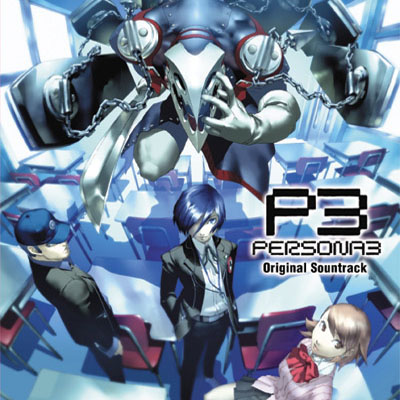The Persona series, for those of you not “in the know” is a spinoff of Atlus’ popular Shin Megami Tensei series. Much like the rest of the SMT series, Persona features characters who encounter demons and the occult. Unlike the rest of the series, however, the Persona titles all tend to be story/place linked and emphasize conversations with, rather than use of the demons to help the party.
Similarly, even though composed by the same person, the Persona series differs from the rest of the SMT games due to the style of music. Composer Shoji Meguro deviates from his techno/industrial sound used in the rest of the series to explore a more hip-hop-ish motif, which works well in the setting of the games. And, while I enjoy his more hardcore sound, there is definite merit in his Persona soundtracks, the latest of which I will now explain.
The opening song of the Persona 3 Original Soundtrack, “Burn My Dread,” starts as a light, hip-hop vocal track, and eventually gains a slightly more hard-core guitar riff. Though short, it’s a catchy little track, followed by series standard “Poem of Everybody’s Souls,” which at over 5 minutes is one of the longest tracks on the CD. “Want to Be Close” is an upbeat techno vocal piece, while “Shadow” is a techno orchestral piece that is darker and might fit better in a Matrix movie.
The battle themes, including “Unavoidable Battle,” and “Mass Destruction” tend to be darker techno themes, the latter including rap vocals, and definitely present themselves as battle themes. I was surprised at how many tracks had vocals included in one way or another, all in English (or at least Engrish). The mix of hip-hop vocals and techno melodies really lends a feel of modernity to the soundtrack, which is what the series strives for, as it takes place in day after tomorrow Japan.
The thing is, certain themes keep returning from track to track, the “tartarus” themes being a prime example, in which a basic melody established in “tartarus_0d01” is repeated and built on in “tartarus_0d02” and up. While this can maintain a narrative feel to the soundtrack, it also tends to emphasize the lack of variety this soundtrack suffers from. I will say that the opening track of the second disc, “Changing Seasons” is a groovy little track just this side of funk, and is definitely catchy, featuring French vocals.
Disc 2 fares a bit better in the atmosphere department, as things get a bit darker and the techno gets more hardcore. “Basement” and “This is Fine…” are prime examples, although tracks such as “Living With Determination” and “Kyoto” deviate, the former being a light piano track, the latter being a Japanesque piece featuring shamisen.
Unfortunately missing from this album is the series standard silly Satomi Tadashi song, replaced by “Current Net Price,” which isn’t as lighthearted, though still slightly silly.
Penultimately, there are the last few battle pieces, including “Battle for Everyone’s Souls” which is an excellent, fast-paced techno arrangement of “Poem of Everyone’s Souls” and “Burn My Dread” which is a hardcore arrangement of the opening song including rap lyrics. Both pieces are definitely above average, and I can imagine fighting battles to them quite easily.
Finally, there is the ending song, “Memories of You” which is another arrangement (this time pop) of “Burn My Dread” and which features Japanese lyrics. I must say I like this song, although I tend to enjoy J-pop songs, and while not incredible, “Memories of You” is a song I could watch credits to. There is one other song after that, “Blues in Velvet Room” which is a jazzy rendition of “Poem of Everyone’s Souls.” Not sure if I like it, but it’s certainly a novel arrangement that I did not expect, and for that it gets some props.
Overall, will you like this soundtrack? If you enjoy the Persona series’ music, you will enjoy this. Also, if you appreciate hip-hop and techno, you’ll probably enjoy this album, though if you’re not familiar with the series and are expecting something like Meguro’s other work in the SMT games, look elsewhere, as this is really a “gaiden” style.




